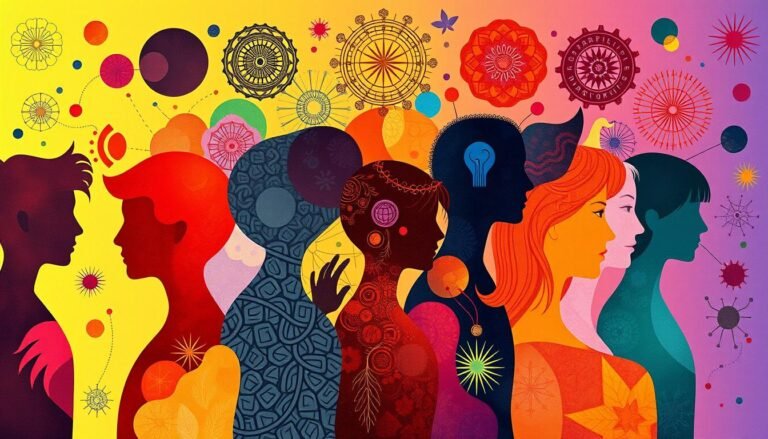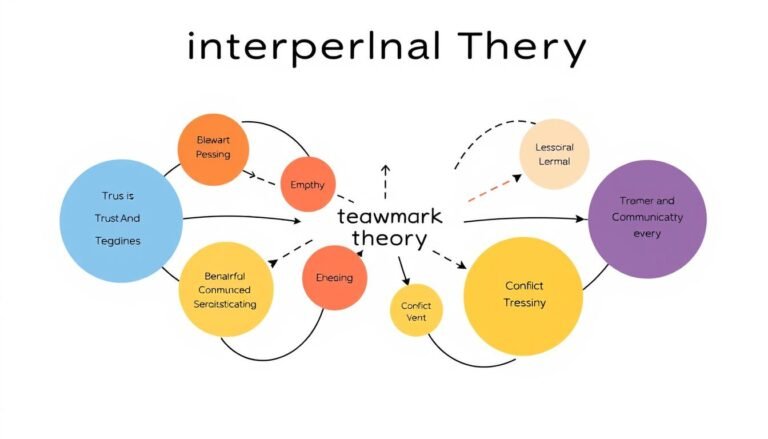Agreeableness and Interpersonal Relationships
Imagine a busy office with many different people. In one spot, Sarah is calming a big argument between two coworkers. She listens to both sides and finds a way to agree, showing how important agreeableness is.
This example shows how agreeableness helps us get along with others. It’s not just about being friendly. It’s about being smart with our feelings and making good connections.
Studies back up how big a deal agreeableness is. A study with 276 kids found it helps them solve problems and handle stress better. Another study with 234 people showed that agreeable kids have better fights, no matter who they’re with.
In work, agreeableness is a big plus. Leaders with this trait are often great because they help others and are trustworthy. These qualities make teams work better and help people move up in their careers.
As we look closer at agreeableness, we’ll see how it affects our lives. It’s key for better personal and work relationships. Learning about and growing this trait can make our lives richer and easier to handle.
Key Takeaways
- Agreeableness is crucial for positive interpersonal relationships
- Studies show agreeable children have better conflict resolution skills
- This trait is associated with empathy and cooperation
- Agreeableness is valuable in leadership roles
- Developing agreeableness can lead to stronger team dynamics
- Understanding this trait can improve personal and professional relationships
Understanding Agreeableness as a Personality Trait
Agreeableness is a key part of the Big Five personality traits model. It affects how we interact with others and handle social situations. Let’s dive into what agreeableness means and its impact on our lives.
Definition and Characteristics of Agreeableness
Agreeableness shows a person’s tendency to be cooperative, empathetic, and altruistic. Those high in agreeableness often seek social harmony and avoid conflicts. They value getting along and may go out of their way to please others.
The Big Five Personality Model
The Big Five model is a well-known framework for personality assessment. It includes five traits: openness, conscientiousness, extraversion, neuroticism, and agreeableness. Each trait has a range, with individuals scoring anywhere from very high to very low.
Measuring Agreeableness in Individuals
Personality assessments use self-report inventories to measure agreeableness. These questionnaires ask people to rate their agreement with various statements. The results show where a person stands on the agreeableness spectrum.
| Facet | High Agreeableness | Low Agreeableness |
|---|---|---|
| Altruism | Puts others first | Self-focused |
| Cooperation | Seeks compromise | Competitive |
| Modesty | Humble | Arrogant |
| Straightforwardness | Sincere | Manipulative |
| Sympathy | Empathetic | Indifferent |
| Trust | Trusting | Skeptical |
Understanding agreeableness can enhance our interpersonal skills and relationships. It’s important to remember that agreeableness is not inherently good or bad. Different situations may require different levels of this trait.
The Impact of Agreeableness on Social Interactions
Agreeableness is crucial in social interactions. Studies reveal that agreeable people have better social skills. They also handle conflicts more smoothly.
A study with 300 undergraduates found agreeable people report fewer health issues during conflicts. Agreeable individuals are more cooperative in daily life. They argue less and see less conflict in social settings.
Communication styles vary with agreeableness levels. A study of 62 young adults aged 18-35 showed how agreeableness affects social dynamics:
| Agreeableness Level | Communication Style | Conflict Resolution Approach |
|---|---|---|
| High | Cooperative, empathetic | Seeks compromise, avoids confrontation |
| Low | Direct, task-focused | Assertive, stands ground in disputes |
Agreeableness positively affects 93% of social variables. It promotes teamwork, investment in relationships, and social integration. In the workplace, agreeable people are great at cooperation and helping others. They are valuable team members.
Agreeableness and Interpersonal Relationships
Agreeableness is crucial for our connections with others. Those with high agreeableness often form strong, positive bonds in both personal and work settings.
Positive Effects on Relationship Quality
Agreeable people are kind and considerate. They often prioritize others’ needs, improving relationship quality. These traits help build trust and encourage open communication.
Conflict Resolution and Agreeableness
In conflicts, agreeable individuals stand out. They use empathy to grasp different perspectives. This skill helps them find solutions that benefit everyone.
Trust-Building and Empathy in Relationships
Empathy is key to agreeableness. It lets people deeply connect with others’ feelings. This understanding builds trust, leading to stronger, more meaningful relationships.
| Trait | Impact on Relationships |
|---|---|
| High Agreeableness | Better conflict resolution, stronger trust, increased empathy |
| Low Agreeableness | More interpersonal conflicts, difficulty building trust |
Agreeable individuals make great partners and friends. They support relationships through kindness and consideration. This approach fosters mutual respect and intimacy, improving relationship quality.
“Agreeableness is the foundation of harmonious relationships, built on trust, empathy, and mutual understanding.”
The Role of Agreeableness in Workplace Dynamics
Agreeableness is key in workplace relationships and team success. It’s part of the Big Five model, shaping how people work together. It affects how we interact with our colleagues and handle team tasks.
Studies show agreeable workers make workplaces better. A study with 648 male military personnel found agreeable personalities lead to more happiness over time. This is especially true when leaders support their teams well.
Agreeable people do well in many areas:
- Teamwork and collaboration
- Conflict resolution
- Customer service
- Ethical behavior
These skills make teams work better together. Agreeable leaders are seen as supportive. This boosts employee happiness and involvement.
| Advantages | Potential Drawbacks |
|---|---|
| Effective conflict resolution | Difficulty with confrontation |
| Enhanced customer satisfaction | Challenges in competitive environments |
| Improved team cohesion | Vulnerability to exploitation |
| Higher ethical standards | Potential indecisiveness |
Agreeableness has many benefits, but it’s important to mix it with assertiveness. This mix helps improve workplace relationships and avoid problems.
Agreeableness and Emotional Intelligence
Agreeableness is key to emotional intelligence and how we interact with others. Studies show that those with high agreeableness can better manage their emotions. This is important for keeping relationships healthy.
Connection between Agreeableness and EQ
Research with 296 general medicine students found interesting links. Higher agreeableness was linked to more rational decision-making. This shows agreeable people might handle emotional situations better.
Benefits of High Agreeableness in Emotional Regulation
High agreeableness helps in emotional regulation. It makes managing one’s and others’ emotions easier. This leads to better social functioning.
In virtual teams, where failure rates are high, agreeable people help build trust. This is key for team success.
Developing Emotional Intelligence through Agreeableness
Working on agreeableness can boost emotional intelligence. By being empathetic, listening well, and solving conflicts, we improve our skills. This is especially useful in virtual teams, where trust and strong relationships are crucial.
“Well-managed virtual teams have been shown to outperform face-to-face teams in terms of collaboration.”
By focusing on agreeableness, we can grow our emotional intelligence. This leads to better personal and work relationships.
Gender Differences in Agreeableness and Relationships
Research shows interesting gender differences in agreeableness, a key factor in relationships. Women usually score higher in agreeableness than men. This affects how they handle social norms and connect with others.
Studies show that gender roles greatly influence these differences. Women often show more communal behaviors, no matter their social status. This is especially true in interactions between women, showing how gender shapes social dynamics.
The Big Five personality model sheds light on these gender disparities:
- Women score higher in Extraversion, Agreeableness, and Neuroticism
- Gender differences are seen in every Big Five trait
- Differences in Extraversion, Openness, and Conscientiousness are more nuanced
These differences in agreeableness greatly affect relationships. Women’s higher scores in communal behaviors might influence their approach to conflict and empathy in relationships.
| Trait | Women | Men |
|---|---|---|
| Agreeableness | Higher | Lower |
| Communal Behavior | More frequent | Less frequent |
| Agency | Situational | Situational |
Understanding these gender differences in agreeableness can help people better navigate relationships. It shows the importance of social norms and personal tendencies in shaping how we interact with others.
The Dark Side of Agreeableness: Potential Drawbacks
Agreeableness can have a positive side, but it also has a darker side. It can lead to problems with setting boundaries and being taken advantage of in relationships. Let’s look at these issues and how to find a healthy balance.
Excessive Agreeableness and Boundary Issues
Those who score high in agreeableness often find it hard to set boundaries. They put others’ needs first, which can cause stress and resentment. A study showed that being too agreeable can make others feel uneasy.
Balancing Agreeableness with Assertiveness
It’s important to find a balance between being agreeable and assertive. Agreeable people might give up their own needs to keep the peace. This can lead to earning less, with agreeable men making 18% less and agreeable women 5% less than their less agreeable counterparts.
Potential for Exploitation in Relationships
Agreeable people might be more likely to be taken advantage of in relationships. Their willingness to help can be used by those with bad intentions. Studies link low agreeableness with aggressive thoughts, showing the need for agreeable people to be cautious.
| Agreeableness Level | Positive Traits | Potential Drawbacks |
|---|---|---|
| High | Warm, helpful, cooperative | Boundary issues, exploitation risk |
| Balanced | Likable, trustworthy | Occasional conflict, some compromise |
| Low | Assertive, competitive | Social adjustment difficulties |
By understanding these drawbacks, people can aim for a better balance. This balance helps in building stronger relationships and personal growth.
Developing Agreeableness: Strategies for Personal Growth
Agreeableness is a trait that can be grown through personal development and social skills training. By focusing on empathy, people can improve their relationships and overall happiness.
One good way to grow agreeableness is by practicing active listening. This means really listening to the speaker, getting their message, and responding well. It builds trust and helps communication in relationships.
Learning how to solve conflicts is also key. Finding solutions that work for everyone is important for keeping peace in personal and work relationships.
Doing things that make you see things from different perspectives can also help. This could be reading books from different cultures, joining cultural events, or helping out in your community.
| Agreeableness Development Strategy | Benefits |
|---|---|
| Active Listening | Improved communication, stronger relationships |
| Conflict Resolution Skills | Better problem-solving, reduced tension |
| Perspective-Taking Activities | Increased empathy, broader worldview |
| Emotional Awareness Exercises | Enhanced emotional intelligence, better self-regulation |
It’s important to understand your own and others’ emotions to grow agreeableness. Mindfulness and self-reflection can help a lot with this.
“The highest form of knowledge is empathy, for it requires us to suspend our egos and live in another’s world.”
By using these strategies, people can grow their agreeableness. This leads to more rewarding relationships and better social skills.
Agreeableness in Different Cultural Contexts
Cultural differences greatly affect personality traits like agreeableness. Research in cross-cultural psychology shows that how we show and value agreeableness changes with society. A study in Türkiye, with over 51 ethnic groups and 3.5 million Syrian refugees, shows agreeableness’s role in getting along with others from different cultures.
The study looked at 1218 college students and found agreeableness is key for those learning to work with different cultures. This shows how important agreeableness is in places with many cultures. In Türkiye, where people from over 73 nations live, agreeableness helps keep things peaceful.
Studies on cultural intelligence (CQ) also show agreeableness’s role in different cultures. A study of 338 business students found a strong link between agreeableness and CQ. This means agreeable people might fit in better in various cultural settings.
| Personality Trait | Relation to Cultural Intelligence |
|---|---|
| Agreeableness | Linked to behavioral CQ |
| Openness | Related to all four CQ factors |
| Extraversion | Connected to cognitive, motivational, and behavioral CQ |
These studies highlight the need to think about culture when studying agreeableness. As our world gets more diverse, knowing how agreeableness works in different cultures helps us communicate and connect better.
The Interplay of Agreeableness with Other Personality Traits
Personality traits mix in complex ways to shape our actions. Agreeableness combines with other traits to create unique differences. Let’s see how agreeableness and other traits affect social interactions.
Agreeableness and Extraversion
Agreeableness and extraversion together boost social skills. A study with 113 participants showed agreeable people adapt better in social settings. This means agreeable extraverts might adjust their behavior more easily.
Agreeableness and Conscientiousness
Agreeableness and conscientiousness impact work and relationships. Research with 109 participants found agreeable people do well in leadership. This shows conscientious, agreeable folks can lead effectively.
Agreeableness and Neuroticism
Agreeableness and neuroticism affect emotional stability in relationships. A study with 571 middle and 233 late adolescents found neuroticism is more linked to conflicts. This means emotional stability is key in relationships, not just agreeableness.
| Trait Combination | Impact on Behavior | Potential Outcomes |
|---|---|---|
| High Agreeableness + High Extraversion | Enhanced social adaptability | Improved interpersonal skills |
| High Agreeableness + High Conscientiousness | Better performance in high-status roles | Effective leadership qualities |
| High Agreeableness + Low Neuroticism | Increased emotional stability | Fewer conflicts in relationships |
Conclusion
Agreeableness deeply affects our relationships. Studies reveal it’s vital for social harmony, with 80.9% of people feeling moderately satisfied in their connections. People high in agreeableness are more empathetic and cooperative, building trust and lowering conflicts.
However, agreeableness’s impact isn’t always clear-cut. A study with 571 teens found neuroticism often led to more conflicts than agreeableness. This shows that growing emotionally stable is also key for good relationships.
Agreeableness levels differ among groups. Women and older adults usually score higher. Genes like CLOCK and CNR1 can also shape agreeable behavior. Knowing these details helps us better navigate our social world, finding a balance between cooperation and assertiveness in our relationships.
Source Links
- Interpersonal conflict, agreeableness, and personality development – PubMed
- Agreeableness Personality Trait
- Agreeableness as a moderator of interpersonal conflict – PubMed
- Agreeableness as a Personality Trait
- From DNA to Disposition: The Genetics of Agreeableness – LifeDNA
- What is agreeableness in psychology: Benefits, Examples – Psyculator
- Agreeableness and the Self-Regulation of Negative Affect: Findings Involving the Neuroticism/Somatic Distress Relationship
- The role of personality in social interaction perception: an ERP and source imaging study – Scientific Reports
- Study: Agreeableness a Helpful Trait for General Success in Life
- Longdom Publishing SL | Open Access Journals
- Agreeableness
- Helping Others Results in Helping Yourself: How Well-Being Is Shaped by Agreeableness and Perceived Team Cohesion
- The Big Five Factor Agreeableness and Workplace Performance
- Impact of emotional intelligence and personality traits on managing team performance in virtual interface
- Personality traits, emotional intelligence and decision-making styles in Lebanese universities medical students – BMC Psychology
- Gender Differences in Personality across the Ten Aspects of the Big Five
- Situational influences on gender differences in agency and communion – PubMed
- Agreeableness Personality: The Hidden Downsides | Human Capital Hub
- The Effects of Partner Extraversion and Agreeableness on Trust
- The Dark Tetrad: analysis of profiles and relationship with the Big Five personality factors – Scientific Reports
- Agreeableness: Traits, Facets, Motivation, Relationships, Careers, and Development | Personality NFT
- Agreeableness Personality: Everything you need to know
- Five-factor personality traits as predictors of intercultural sensitivity among Turkish preservice teachers
- Agreeableness: Everything You Need to Know When Assessing Agreeableness Skills
- Trait agreeableness and social status moderate behavioral responsiveness to communal behavior – PubMed
- The Role of Agreeableness, Neuroticism, and Relationship-Specific Features in Self- and Other-Perceptions of Conflict Frequency in Adolescent Relationships with Parents and Peers – Journal of Youth and Adolescence
- The Role of Agreeableness, Neuroticism, and Relationship-Specific Features in Self- and Other-Perceptions of Conflict Frequency in Adolescent Relationships with Parents and Peers
- How Genes Influence Your Agreeableness
- Relationship between Personality Traits and Satisfaction in








